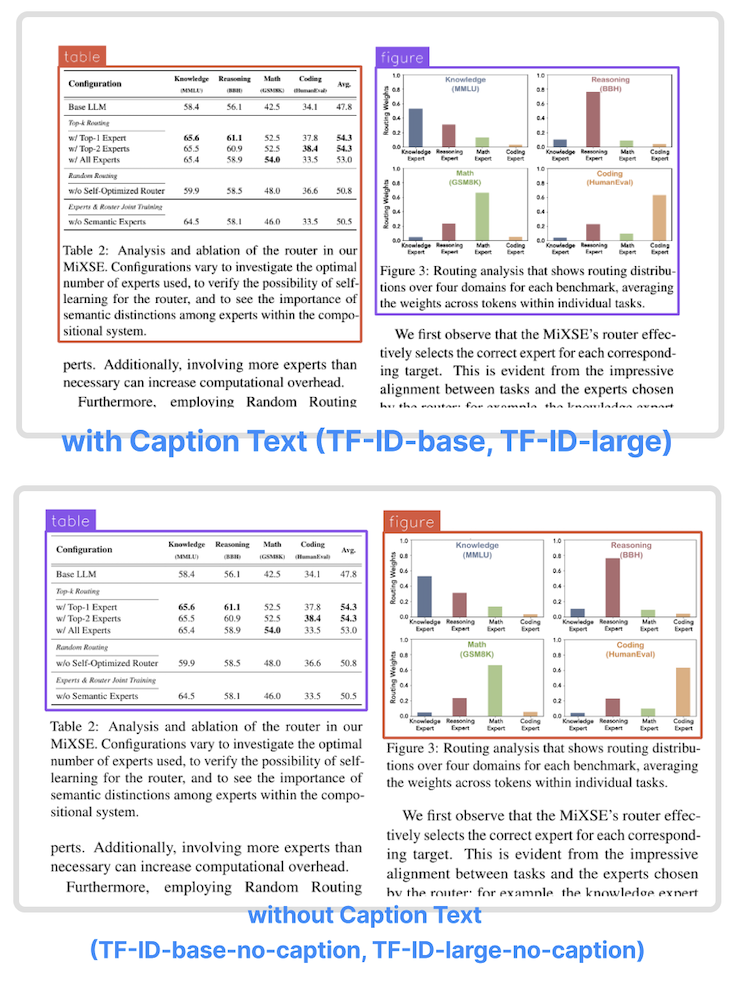|
--- |
|
license: mit |
|
license_link: https://huggingface.co/microsoft/Florence-2-base-ft/resolve/main/LICENSE |
|
pipeline_tag: image-text-to-text |
|
tags: |
|
- vision |
|
- ocr |
|
- segmentation |
|
datasets: |
|
- yifeihu/TF-ID-arxiv-papers |
|
--- |
|
|
|
# TF-ID: Table/Figure IDentifier for academic papers |
|
|
|
## Model Summary |
|
|
|
TF-ID (Table/Figure IDentifier) is a family of object detection models finetuned to extract tables and figures in academic papers created by [Yifei Hu](https://x.com/hu_yifei). They come in four versions: |
|
| Model | Model size | Model Description | |
|
| ------- | ------------- | ------------- | |
|
| TF-ID-base[[HF]](https://huggingface.co/yifeihu/TF-ID-base) | 0.23B | Extract tables/figures and their caption text |
|
| TF-ID-large[[HF]](https://huggingface.co/yifeihu/TF-ID-large) (Recommended) | 0.77B | Extract tables/figures and their caption text |
|
| TF-ID-base-no-caption[[HF]](https://huggingface.co/yifeihu/TF-ID-base-no-caption) | 0.23B | Extract tables/figures without caption text |
|
| TF-ID-large-no-caption[[HF]](https://huggingface.co/yifeihu/TF-ID-large-no-caption) (Recommended) | 0.77B | Extract tables/figures without caption text |
|
All TF-ID models are finetuned from [microsoft/Florence-2](https://huggingface.co/microsoft/Florence-2-large-ft) checkpoints. |
|
|
|
- The models were finetuned with papers from Hugging Face Daily Papers. All bounding boxes are manually annotated and checked by humans. |
|
- TF-ID models take an image of a single paper page as the input, and return bounding boxes for all tables and figures in the given page. |
|
- TF-ID-base and TF-ID-large draw bounding boxes around tables/figures and their caption text. |
|
- TF-ID-base-no-caption and TF-ID-large-no-caption draw bounding boxes around tables/figures without their caption text. |
|
|
|
**Large models are always recommended!** |
|
|
|
 |
|
|
|
Object Detection results format: |
|
{'\<OD>': {'bboxes': [[x1, y1, x2, y2], ...], |
|
'labels': ['label1', 'label2', ...]} } |
|
|
|
## Training Code and Dataset |
|
- Dataset: [yifeihu/TF-ID-arxiv-papers](https://huggingface.co/datasets/yifeihu/TF-ID-arxiv-papers) |
|
- Code: [github.com/ai8hyf/TF-ID](https://github.com/ai8hyf/TF-ID) |
|
|
|
## Benchmarks |
|
|
|
We tested the models on paper pages outside the training dataset. The papers are a subset of huggingface daily paper. |
|
|
|
Correct output - the model draws correct bounding boxes for every table/figure in the given page. |
|
|
|
| Model | Total Images | Correct Output | Success Rate | |
|
|---------------------------------------------------------------|--------------|----------------|--------------| |
|
| TF-ID-base[[HF]](https://huggingface.co/yifeihu/TF-ID-base) | 258 | 251 | 97.29% | |
|
| TF-ID-large[[HF]](https://huggingface.co/yifeihu/TF-ID-large) | 258 | 253 | 98.06% | |
|
|
|
| Model | Total Images | Correct Output | Success Rate | |
|
|---------------------------------------------------------------|--------------|----------------|--------------| |
|
| TF-ID-base-no-caption[[HF]](https://huggingface.co/yifeihu/TF-ID-base-no-caption) | 261 | 253 | 96.93% | |
|
| TF-ID-large-no-caption[[HF]](https://huggingface.co/yifeihu/TF-ID-large-no-caption) | 261 | 254 | 97.32% | |
|
|
|
Depending on the use cases, some "incorrect" output could be totally usable. For example, the model draw two bounding boxes for one figure with two child components. |
|
|
|
## How to Get Started with the Model |
|
|
|
Use the code below to get started with the model. |
|
|
|
```python |
|
import requests |
|
from PIL import Image |
|
from transformers import AutoProcessor, AutoModelForCausalLM |
|
|
|
model = AutoModelForCausalLM.from_pretrained("yifeihu/TF-ID-base", trust_remote_code=True) |
|
processor = AutoProcessor.from_pretrained("yifeihu/TF-ID-base", trust_remote_code=True) |
|
|
|
prompt = "<OD>" |
|
|
|
url = "https://huggingface.co/yifeihu/TF-ID-base/resolve/main/arxiv_2305_10853_5.png?download=true" |
|
image = Image.open(requests.get(url, stream=True).raw) |
|
|
|
inputs = processor(text=prompt, images=image, return_tensors="pt") |
|
|
|
generated_ids = model.generate( |
|
input_ids=inputs["input_ids"], |
|
pixel_values=inputs["pixel_values"], |
|
max_new_tokens=1024, |
|
do_sample=False, |
|
num_beams=3 |
|
) |
|
generated_text = processor.batch_decode(generated_ids, skip_special_tokens=False)[0] |
|
|
|
parsed_answer = processor.post_process_generation(generated_text, task="<OD>", image_size=(image.width, image.height)) |
|
|
|
print(parsed_answer) |
|
|
|
``` |
|
|
|
To visualize the results, see [this tutorial notebook](https://colab.research.google.com/github/roboflow-ai/notebooks/blob/main/notebooks/how-to-finetune-florence-2-on-detection-dataset.ipynb) for more details. |
|
|
|
## BibTex and citation info |
|
|
|
``` |
|
@misc{TF-ID, |
|
author = {Yifei Hu}, |
|
title = {TF-ID: Table/Figure IDentifier for academic papers}, |
|
year = {2024}, |
|
publisher = {GitHub}, |
|
journal = {GitHub repository}, |
|
howpublished = {\url{https://github.com/ai8hyf/TF-ID}}, |
|
} |
|
``` |